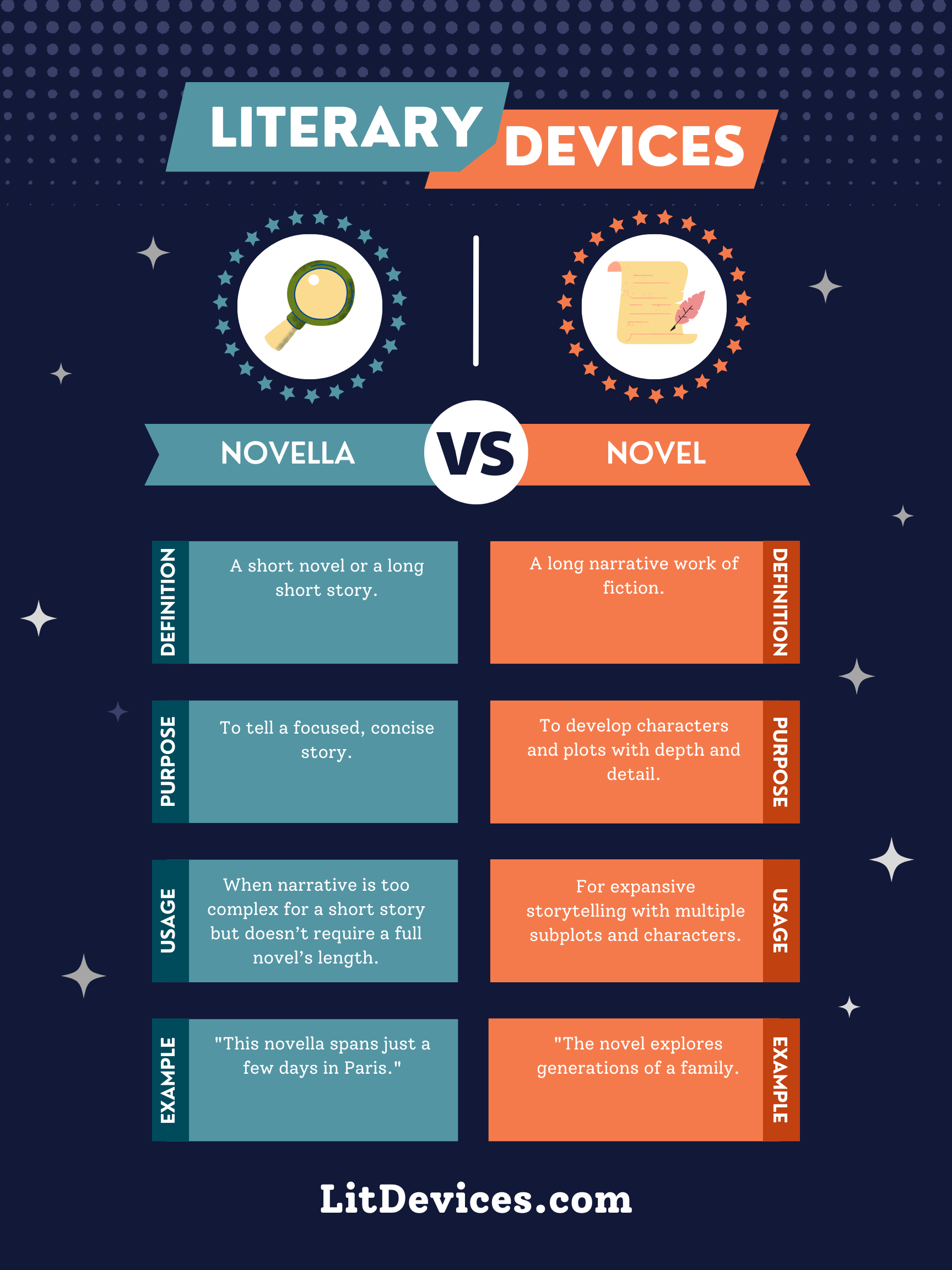A Novella is shorter than a novel and focuses on a single incident or series of linked incidents, with a more straightforward plot; A Novel is longer, offering a deeper exploration of characters, settings, and themes.
In the spectrum of narrative forms, novellas and novels occupy unique spaces, each offering distinct opportunities for storytelling. Let’s dive into the nuances that define and distinguish them. 📘✨
Novella
A novella strikes a balance between the concise storytelling seen in short stories and the complex narrative scope of novels. With its moderate length, it allows for character development and plot expansion without the breadth of a novel. Franz Kafka’s “The Metamorphosis” is an exemplary novella, focusing on the extraordinary incident of a man turning into an insect and its impact on his life and family.
Novel
Novels provide a broad canvas for authors to develop intricate plots, delve into detailed character backgrounds, and explore varied themes and settings. Their extended length supports complex narratives that can span multiple locations and time periods, weaving together various storylines. “Pride and Prejudice” by Jane Austen, with its detailed examination of manners, marriage, and morality in 19th-century England, serves as a classic example.
Summary
| Literary Device | Definition | Purpose | Usage | Relevant Examples |
|---|---|---|---|---|
| Novella | A work of fiction shorter than a novel, focusing on a single incident or a series of linked incidents. | To tell a focused, concise story. | Literary fiction. | “The Metamorphosis” by Franz Kafka. |
| Novel | A lengthy work of fiction, offering in-depth exploration of characters, settings, and themes. | To provide a comprehensive narrative experience with complex plots and character development. | Literary fiction, genre fiction. | “Pride and Prejudice” by Jane Austen. |
Writing Tips
For Novella Writers:
- Focus Your Narrative: Center your story around a central theme or event.
- Economy of Words: Be judicious in your descriptions and character developments to maintain a tight narrative.
- Pace Appropriately: Ensure your story moves at a pace that keeps readers engaged without feeling rushed.
For Novel Writers:
- Develop Your Characters: Take advantage of the length to fully flesh out your characters and their motivations.
- Build Your World: Create a vivid setting or multiple settings that enrich your story.
- Manage Subplots: Weave in subplots that complement and enrich the main storyline.
FAQs
How do you decide whether to write a novella or a novel?
Consider the scope of your story and the depth of character exploration needed. A more focused or concise tale may be suited to a novella, while complex narratives requiring extensive development benefit from the novel format.
Can novellas and novels be part of a series?
Yes, both forms can be part of larger series. Novellas often serve as interludes or supplementary tales, whereas novels can build extensive, interconnected universes.
Exercise
Read the following excerpt: “In a town where everyone knew everyone else’s business, the mysterious newcomer’s arrival at dusk sparked a series of events that would forever change the community.”
Answer: This passage could serve as the premise for either a novella or a novel, depending on the depth of exploration. The emphasis on a singular series of events suggests a novella, but if expanded to explore the newcomer’s impact in depth, it could develop into a novel.
Other Interesting Literary Device Comparisons
- Short Story vs Novella: Both are shorter than novels, but novellas are longer than short stories, offering more room for plot and character development.
- Biography vs Memoir: A biography is a detailed account of someone’s life written by someone else, while a memoir focuses on personal memories and experiences from the author’s perspective.
- Dystopian vs Utopian Fiction: Dystopian fiction presents an imagined future society marked by great suffering or injustice, typically under totalitarian rule, while utopian fiction depicts idealized societies where peace and perfection have been achieved.
Exploring these forms and devices enriches our understanding of storytelling, offering diverse ways to engage with readers and convey narratives. 📚🌟

